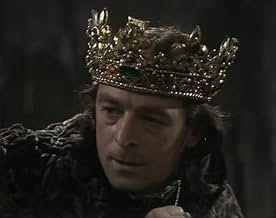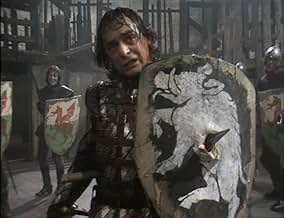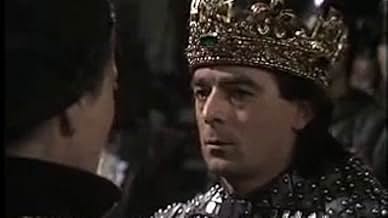CALIFICACIÓN DE IMDb
8.2/10
255
TU CALIFICACIÓN
Agrega una trama en tu idiomaRichard of Gloucester uses murder and manipulation to claim England's throne.Richard of Gloucester uses murder and manipulation to claim England's throne.Richard of Gloucester uses murder and manipulation to claim England's throne.
- Dirección
- Guionista
- Elenco
Antony Brown
- Sir Richard Ratcliffe
- (as Anthony Brown)
- Dirección
- Guionista
- Todo el elenco y el equipo
- Producción, taquilla y más en IMDbPro
Opiniones destacadas
Again, we see another example of a great 'lost' film. This is without a doubt the best Richard III on film (or in this case on videotape). Why, oh why, are so many such great films like this consigned to a film vault somewhere, gathering dust, when they could be making their owners lots of cash??? It's incredible to me that great works of cinematic and TV art are in danger of being permanently lost to us, while lesser works are on videotape and DVD in various versions including letterboxed, full screen, special edition, etc.
This teleplay is among the best British TV dramas ever produced. Won't someone please get great British TV dramas like this released on DVD???
This teleplay is among the best British TV dramas ever produced. Won't someone please get great British TV dramas like this released on DVD???
As a fan of Richard III, I've seen every version produced. I still do not understand why anyone likes Laurence Olivier's version with its grim, heavy-handed performance. Ron Cook is the perfect Richard, upbeat and energetic, sly and humorous, delighting in his mission until the weight of his crimes begin to trouble his conscience. Jane Powell's direction, as she did with Henry VI parts I, II and III (my favorite of the series), keeps the action moving and the characters in sharp focus, especially King Edward, whose final speech is one you'll always remember. This is the Richard that Shakespeare wanted his audience to see, a man of a courage who loses control of his ambition.
In 1982, the BBC, in their undertaking to produce all of Shakespeare's plays, assembled a company of actors which would take us, in one logical arc, from Henry VI part one right through to Richard III. This is notable in that through all four plays, the principal actors keep their roles (although smaller roles are also undertaken). This gives an unparalleled clarity to the events as you see the chaste Margaret descend to Machiavellian plotting to destroy challengers to her grip on power, and then her downfall as Edward and then Richard take power. It is fitting that she, in a horrific scene at the end of this play, is seen atop a mound of dead. This was, after all, her legacy.
In a simple, but effective, set, with authentic costumes and asides taken directly to camera, this brings your closer to Shakespeare's work than much of the praised films and productions in the past.
If you found Olivier's version just too hammy to bear..... try this one.
In a simple, but effective, set, with authentic costumes and asides taken directly to camera, this brings your closer to Shakespeare's work than much of the praised films and productions in the past.
If you found Olivier's version just too hammy to bear..... try this one.
I love Shakespeare, both classically performed and the recontextualised adaptations of recent years, but this production, made with a large budget (British television-wise) with a talented director and a superb cast somehow manages to fail spectacularly to bring Shakespeare's classic play to life. I would not envy Jane Howell's task of directing Richard III using the (almost) complete text as a shooting script, but I think she could have approached it in a more imaginative fashion, making better use of television conventions. Save for the close-up and the shot-reverse shot technique, Howell prefers to display what is simply "Filmed Theater", with a set that offers little to a medium as visual as television. The performances, though excellent, don't really come across with the power and passion they no doubt would in the theater, and the end result is a four hour long dirge that does no credit to Shakespeare's sharp and vibrant play.
10MarkB-11
I'm fairly sure that many educated and interested-in-film folk have seen the superb and terrifying McKellen version, but sadly, I'd bet hardly anyone remembers this version, which in the original was the capstone of the cycle of plays that begins with Richard II and continues through the various Henry plays (six of 'em). The series was cast as a whole, and the list of actors is a who's-who of British acting skill, culminating in this horrorshow of a play. From the opening moments, when the camera pulls back from the last frame of Henry VI, Part III to reveal a small blackboard, onto which a disembodied hand scrawls Richard III in chalk, to the final frame, where Margaret sits, cackling hysterically atop a pile of bodies (all the characters killed in the preceding eight plays), this version assaults you and tests your ability to withstand true, and intentional villainy, as personified in the demonic Richard. See this version...plague the BBC with letters asking for it to be reissued...write to the actors and shower them with adulation..whatever it takes to return this play to the public eye, where it richardly belongs. Cheers!
¿Sabías que…?
- TriviaThis episode was filmed on the same set as the three Henry VI plays. However, designer Oliver Bayldon altered the set so it would appear to be a ruin, as England reached its lowest point of chaos. In the same vein, the costumes became more and more monotone as the four plays went on; The First Part of Henry the Sixth (1983) features brightly coloured costumes which clearly distinguish the various combatants from one another, but by this point, everyone fights in similarly coloured dark costumes, with little to differentiate one army from another.
- ErroresWhen Henry VI's corpse is borne in on a brier, the Queen laments the passing of her husband. When she removes the sheets, Henry VI's stomach can clearly be seen heaving.
- ConexionesFeatured in The Story of English: A Muse Of Fire (1986)
Selecciones populares
Inicia sesión para calificar y agrega a la lista de videos para obtener recomendaciones personalizadas
Detalles
Contribuir a esta página
Sugiere una edición o agrega el contenido que falta





























